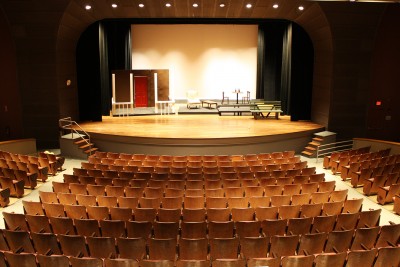
Boston University President Robert Brown, University Provost Jean Morrison and Faculty Council Chair Stephen Brady addressed current initiatives and the state of undergraduate education Wednesday at the Spring 2016 Faculty Assembly.
The assembly focused on three reports. A report from Brown addressed faculty unionization and undergraduate recruitment, another report from Morrison talked about the recently proposed first university-wide general education program and the last report from Brady highlighted the development of the Diversity and Inclusion Task Force.
Members from the BU Medical Campus could also participate by attending a videoconference from the Dean’s Conference Room on 72 East Concord St.
Brady and Gene Jarrett, co-chairs of the Diversity and Inclusion Task Force, presented the task force’s official recommendations that they will submit to Brown and Morrison in May and to the Board of Trustees this coming fall.
The four recommendations are to appoint an associate provost for faculty diversity and inclusion, to create strategic plans to meet this goal “at multiple levels” through a task force focused on implementation, to communicate widely on campus and nationally about the university’s efforts on diversity and to create “pipeline” programs for underrepresented doctoral students who may become faculty members.
“We are making progress, and there have been a number of initiatives in the provost’s office that are paying dividends that are not widely known,” Brady said. “Particularly among new recruitment, there is progress being made.”
Brady said an overwhelming majority of students reported that on top of more diversity in the hiring of faculty, they desired education for current faculty on sensitivity.
Brown spoke on the unionization of full-time lecturers. He emphasized that the decision to unionize is ultimately their choice and encouraged faculty to discuss the “important” decision with their lecturer colleagues during the voting period.
“Each lecturer has to ask themselves why they want to join a union, what will we gain and what could potentially be lost,” Brown said in his speech. “I hope all of our faculty colleagues will discuss the pros and cons of this important decision with their lecturer colleagues.”
Morrison introduced the proposed general education program dubbed “BU Hub.” Morrison focused on the process and content of the proposal made by the Task Force on Undergraduate General Education.
“The proposal reflects a great deal of consultation … [and] articulates the unique aspects and value of a BU undergraduate degree,” Morrison said in her speech. “The document that this group has developed … has the potential to become a national model for general education going forward.”
Beth Loizeaux, associate provost for undergraduate affairs, and Bruce Schulman, a history professor in the College of Arts and Sciences, represented the task force in the assembly. Loizeaux said the task force met with faculty from all 17 schools and colleges, then held meetings from December of last year through February to compile information from the consultations into their report.
Schulman said during the assembly that the task force found “widespread support for the idea, especially from students” and explained that the Cross-College Challenge, a “signature” part of the BU Hub program, “originated from the students that faculty, parents, alumni and stakeholders endorsed.”
Feedbacks on the program included a number of investigations regarding the program’s implementation, Schulman explained.
The program’s timeline includes a three-year piloting and phase-in process, Schulman explained. The project would be independent of current collaborative projects in other colleges, such as the keystone project in the Arvind and Chandan Nandlal Kilachand Honors College.
Faculty members who attended the assembly were pleased with the multitude of topics covered, especially the task forces’ presentations.
Stephanie Watts, a professor in the Questrom School of Business, said she was interested in the presentations on the general education proposal, the recommendations delivered by the Task Force on Diversity and Inclusion and support for international students.
“We’ve been recommending [an associate provost for diversity] for many years,” she said. “In order to be co-measured with our peer institutions, we need an office of diversity. BU does seem to be doing very well on its increasingly competitive admissions. We’re down to under a 30 percent acceptance rate, down from 70 percent 10 years ago.”
John Hart, a professor in the School of Theology, was impressed with the presentation made by the task force and had suggestions of his own.
“I was particularly interested in the new information on diversity here,” he said. “It seems like progress is being made. Job descriptions, if you are an underrepresented minority, are not always worded in a way so that they [are] geared toward you and your experience. When the school is looking to hire diverse professors, they need to start with the positions.”
Brady, a professor in the BU School of Medicine, said the assembly was important to unite faculty for discussion.
“We had a lot of issues to address today … The faculty assembly is the body whereby we communicate with the faculty as a whole so that they can be involved in the government of the university,” he said.


















































































































